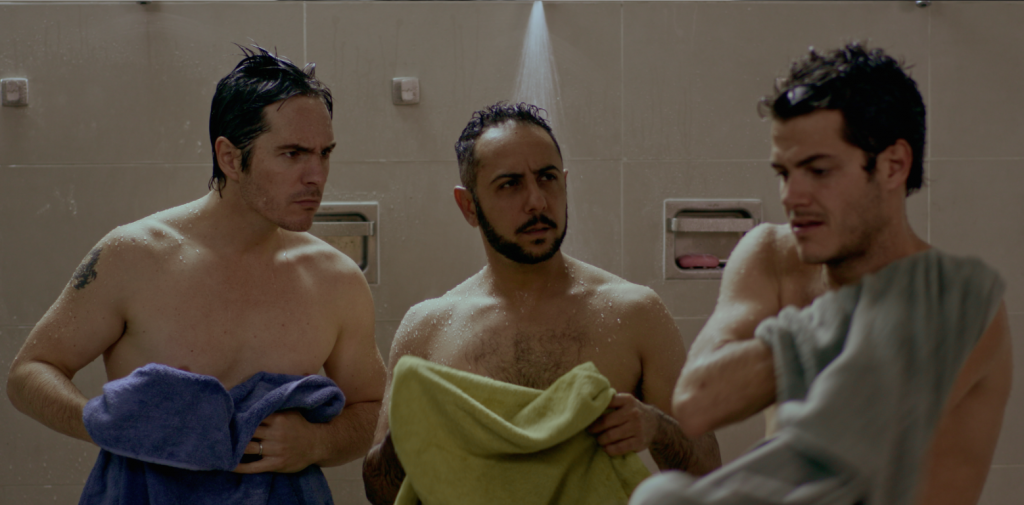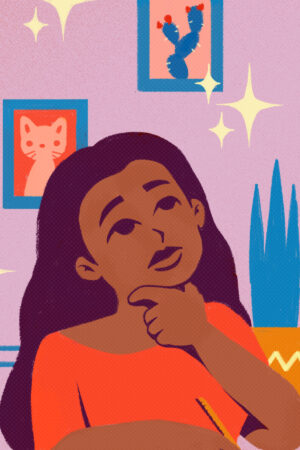When the trailer for Nicolás López‘s latest film, the Mexico-set Hazlo como hombre, dropped I had a lot of questions. Here was a comedy that, from what I could tell, was designed to poke fun at the regressive, machista, and homophobic men that are sadly all too common in Latin American countries. Thus, when Santiago (Alfonso Dosal) comes out to his best bud Raúl (Mauricio Ochmann), he finds his friend unable to be supportive. Raúl is intent, instead, on “fixing” his BFF and de-gay him by whatever means necessary.
Marketed as a broad comedy that made homophobes the punchline – while selling a trailer on the strength of rape/dropping the soap in the shower jokes – I was all too eager to see what López’s film actually looked like. It has, after all, become a box office success in Mexico, and heads now to US screens as one of the most successful Spanish-language comedies to be released by Pantelion Films, aka the people responsible for all those Karla Souza films you love. Would I find a tone-deaf comedy that, in trying to satirize homophobes would only make them into hilarious buffoons whose insidiously retrograde antics were cause for laughs rather than fright? Or would I find a well-intentioned attempt at revealing homophobia for the utterly destructive social force it is when used to discredit gay people’s own experiences?
https://twitter.com/NicolasLopez/status/897137307861569536
Turns out, I found something in between. For starters, the film opens with a self-aware disclaimer: “Advertencia. El protagonista de esta película es un machista, homofóbico, retrógado. Rogamos no repetir su comportamiento en casa” (“Warning: the leading man in this film is a homophobic, retrograde, machista. We urge you not to copy his behavior at home.”) Except, of course, the film never quite attempts to dispel those ideas he has in his head about what it means to be a “real man” (hint: they include being married to a woman, playing video games, caring about cars, and, improbably, feeling okay with cheating on said wife). Instead, López and his co-writer Guillermo Amoedo are all too happy framing those ideas as quaint, hilarious eccentricities that Raúl doesn’t grow out of so much as he manages to suppress them long enough to remember his friend is, what a surprise, the same guy he’d always known.
In essence, Hazlo como hombre struck me as a ’90s U.S. comedy that was as well-meaning as it was ill-conceived. But I also knew that, despite having been brought up in Colombia, my decade here in the U.S. has colored what I expect from seemingly LGBT-friendly popular culture. Which is why I welcomed the chance to chat with López about his project’s cultural implications. The conversation was enlightening for both of us even if we ended where we both began: me, wishing his comedy would have forgone gay panic as its central plot device, and him insisting it was refreshing to see these kinds of characters and stories on mainstream screens in Mexico for the sake of starting conversations about contemporary homophobia. Check it out below.
Hazlo como hombre opens in US theaters on September 1, 2017.
Where did the idea for the movie first come from?
I was in Mexico talking to a lot of friends talking about how different it is if you wanted to come out of the closet, especially in Latin cultures. We started to talk about how suddenly there were a lot of late-bloomers who were coming out of the closet in their thirties. And somebody, while we’re talking, said, oh this one person came out of the closet and it was shock because he was – he looked “normal.” I was like, “What? What do you mean by that?” He said, “Oh, he didn’t look gay at all!” But I kept pushing: “What do you mean by that? Why do you need to be to be ‘gay’? Like, do you need to listen to Rihanna, you know?” Finally, there was this conversation where we were talking about that even though we think that we live in a time and age where all of that isn’t important [any more], it still is. Especially if you were born in the 80s. Because now you’re a Millennial, you were in high school while watching Glee. But for my generation, it’s still an issue. Especially if you’re Latino.
Everybody who’s Latin has something homophobic in them. We have that, you know? It has to do with our – I mean, it comes from your mom. Like, you can’t wear pink! Men don’t cry! Then when you’re in school, every joke is a gay joke. I was very interested in making a movie that could make fun of homophobic people. That could make fun of this whole macho culture. Because there have been so many movies about coming out of the closet, and most of them they end up being dramas. And then every gay character in every mainstream comedy they’re always the “best friend” of the lead. Or the one that knows everything about fashion. I was like, that’s lame! I thought we should make a movie where we make fun of the people that laugh at those [gay] jokes. Let’s turn the camera and let’s point it at the people who are extremely homophobic, who are always making gay jokes, and what would happen to them if one of their friends ended up being gay. And how their whole construction of society would collapse.
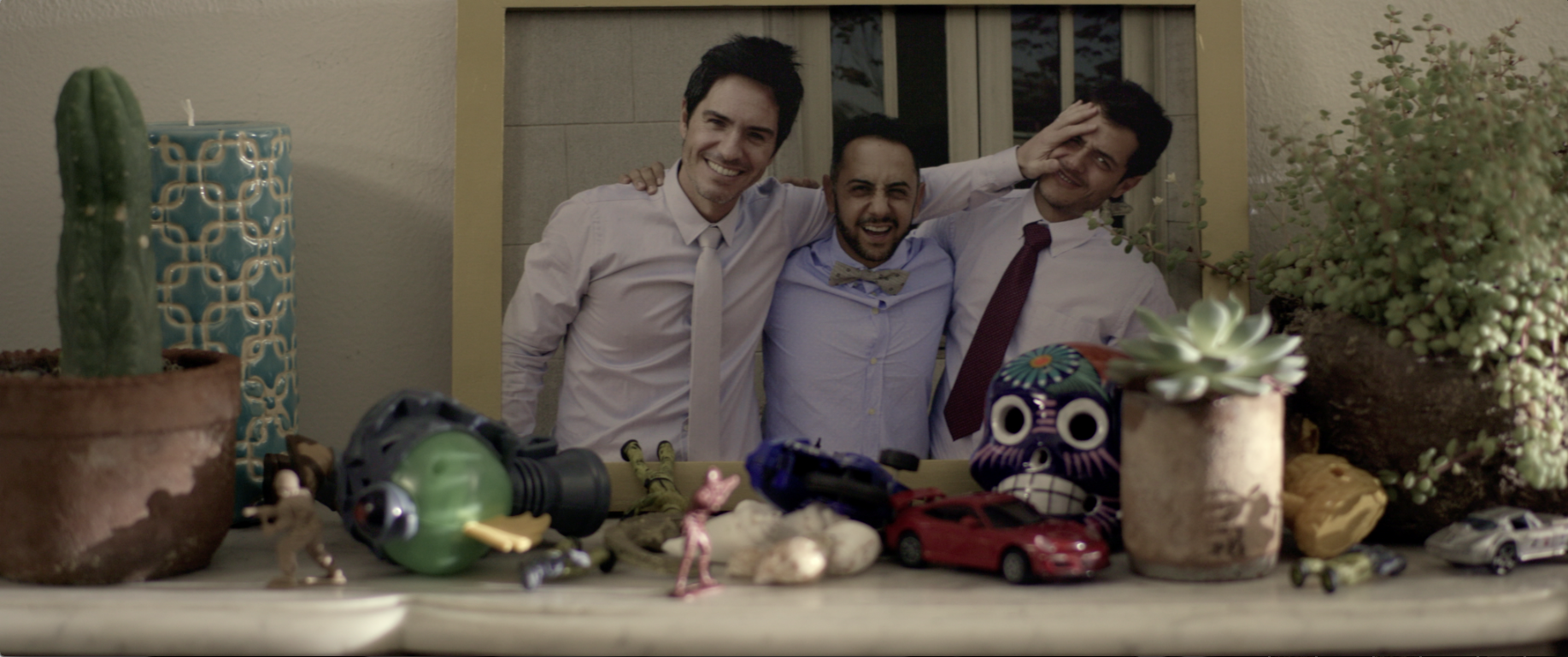
Were you worried that certain jokes that are in the film are both homophobic in themselves even as you’re making fun of homophobia? Was there a conversation about how far you could push things?
For me, it’s all about not judging in one way or the other. It’s about showing our reality. If you go into a bar and you start seeing how people talk; the real way they talk. I rewrote the movie with Alberto Fuguet, who’s a Chilean writer that wrote two books that are classic gay books in Latin America. He was great in the way of defining what was the tone – like, maybe that’s extremely homophobic, but that’s real! And it’s funny! It’s funny because it’s real and it’s offensive. I think what happens with most entertainment that comes from the U.S. is that they don’t show things how they are when you make something that tries to be mainstream – of course you can find that in a small festival movie, let’s say. But when people are making mainstream movies they make them as safe as they can. And I also think that that’s lame. A movie has to show our reality. And even though you’re not okay or if you don’t accept that reality, you have to point the camera at it and show it. What I like about the movie is that the movie doesn’t really judge anyone. It just shows how people are. For me, the best thing that could happen, is that many people are gay and that haven’t come out – they go see the movie with someone close to them. And, of course, they all laugh because they think that the main character is stupid because he’s homophobic. So they start talking about the movie and they finally they get to a point where they can say, “I’m glad you thought the character is stupid and that his reaction is stupid because I’m gay and I didn’t know how to tell you this.” For me, the fact that that’s happening, is the best compliment ever!
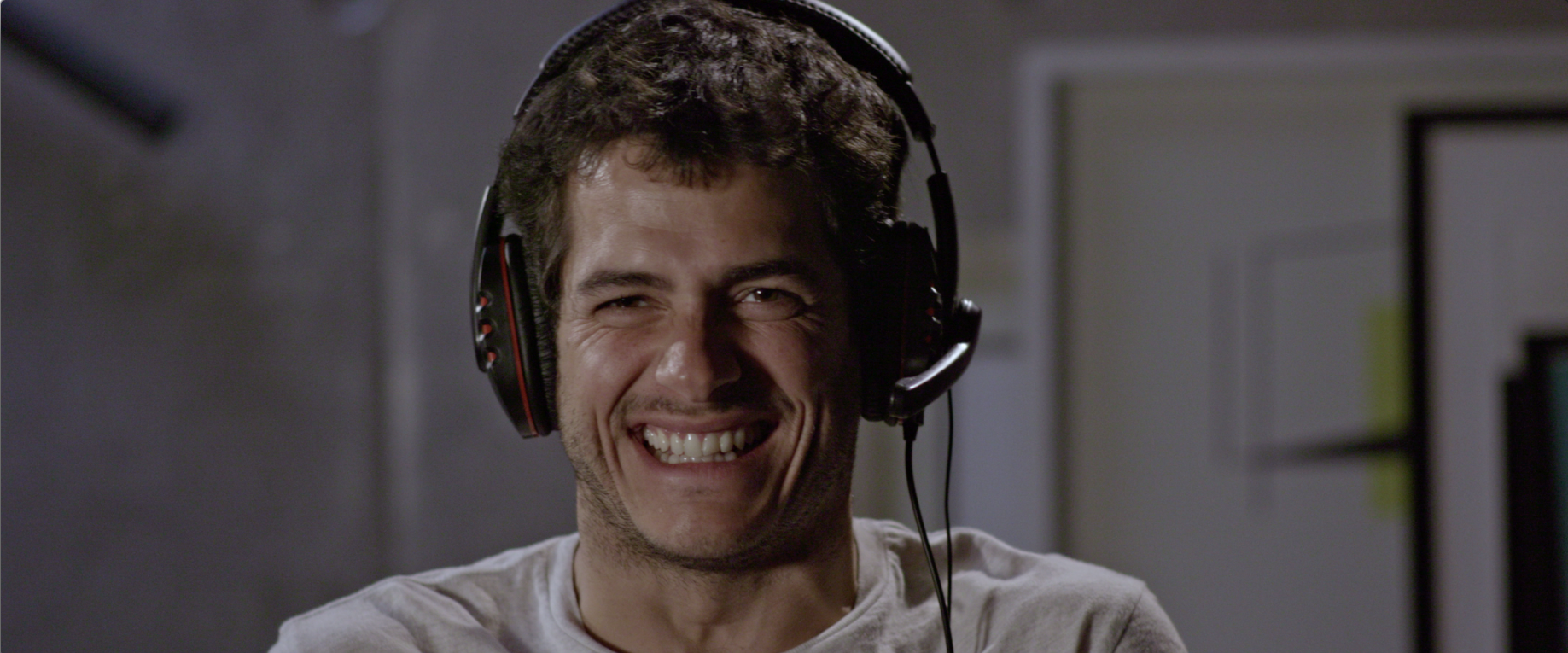
This is the other thing I wanted to ask about. Who is the movie addressed to? As you’re talking about it, it strikes me that it’s addressed at the straight community. Because, again, a lot of jokes land in my ear (and I’m a gay man from Latin America) quite differently, I think, than they would, to a straight person who may not be aware they know gay people.
Of course! For me, it was a chance as a filmmaker who has a lot of gay friends to deal with the transition of how things have changed in Latin culture. Latin culture is extremely macho. Suddenly, things like seeing Mexico City become like a gay capital of the world. Things have changed but also not really. You know, there was the gay pride parade a few months ago and I was walking there. So they closed one of the main streets in D.F. and a taxi driver was trying to get onto that street that was closed. There were cops and they were telling him, “You can’t go there. The street is closed and they’re doing a parade.” And the cab driver, I think it was like an Uber driver, actually, goes, “Oh, so now you have to be a fucking queer to go down Reforma?” He said that to the cops! And what happened to the cops? They laughed their asses off! They thought it was the funniest joke ever. Literally, three meters from there people were celebrating gay pride. I was like, “This is what the movie talks about.” About the things we don’t want to see. About how for the straight community it’s okay this whole bashing gays – how you show how manly you are with the most gay jokes you can make. I always that that was something very interesting and to make fun of that character. Because he’s always the winner. It’d be like here, making fun of the jock. And the gay community in Mexico (and all over Latin America) they are loving the movie because finally they have a movie that they can show to their straight friends, let’s say. That’s like a mirror. They see themselves, and that once they see themselves, they figure out it’s not okay to behave like that. You know the movie says that times have changed but Raúl hasn’t.
And doesn’t at the end.
Yes. We live in a world with closet homophobes. Any movie from 2005 onwards, like any movie with Adam Sandler – like, if you release those movies today they would be considered extremely homophobic. But 10 years ago, that was completely okay.
Well, people considered them extremely homophobic even then.
No, well, yeah. But they were part of the mainstream entertainment.
Yes, and this is what I think about it in terms of the audience. Because there were people when I Know Pronounce You Chuck and Larry came out that dubbed it homophobic, despite it being a “mainstream success.” But I get the point.
For me, what’s been really amazing about the movie is that everybody thought since you had a gay character that it would be a niche movie. But it shows that in Mexico, the most like machista country ever, suddenly people decided to laugh about this and laugh about themselves. If there is something that can heal and can start a conversation, it’s always laughter. That’s why I make comedies.
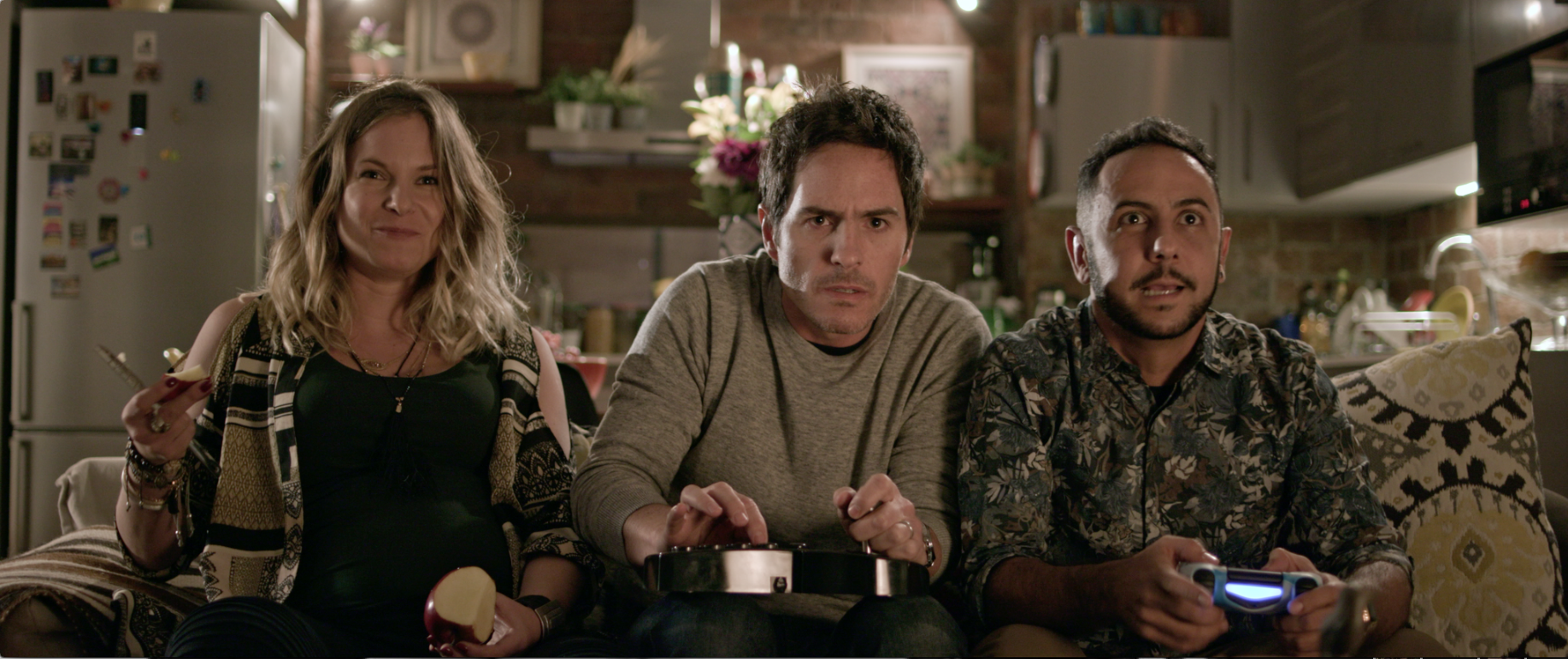
There’s a way in which as the movie is showing a gay character that we don’t often see (“normal” as your friend would say), it also presents an image of gayness that feels very similar to straightness. Santiago wants a boyfriend and he doesn’t understand or really want to partake in polyamory, for example.
I mean, for me, it’s basically that the only character who is more conservative, let’s say, is the one that comes out of the closet. He’s the one who wants to have a real relationship. Who doesn’t want to cheat. He’s like a romantic. And that’s something that I wanted to show in a way how it was for him to enter this new world as a late bloomer and he suddenly discovers that the world he wanted to be a part of is actually very similar to the straight world from where his friend Raúl is from. Monogamy vs being with other, Grindr and Tinder and stuff – it’s all based on this story of a friend who came out of the closet when he was 34 and telling me all these stories. He was extremely romantic: “I don’t want to go to clubs. I want somebody that I can nuzzle with and watch Netflix with. Somebody who’s gonna love me.”
https://twitter.com/NicolasLopez/status/892053319186821120
Right, which is sort of a different version of the machismo we see in traditional family values that run through Mexico and Latin America.
Of course! The movie doesn’t judge. It just shows that whatever you are, whatever you like, you know: “Love is Love.” It’s all about showing how things are and not taking a stance for anybody. I don’t think this movie is THE movie about when you come out of the closet. It’s not the movie about how you’re homophobic. It’s about showing how things are in a specific culture and how that culture is extremely fucked up, basically.
That’s why it’s sometimes hard to look past at the fact that while the movie doesn’t judge the gay character, but it also doesn’t judge the homophobic character, who seems, at the end, to tolerate his friend’s sexuality. But only to the extent that it’s his friend. His homophobia hasn’t changed by the end.
I don’t think people change. Like, you know what a dimmer is, with the lights? You can change the dimmer. If you are extremely macho it’s very hard for you to change because since you were 18, a whole part of your education made you like that. So you can polish yourself, but it’s very hard to be a different person. It happens, but also, I never wanted to make the official movie about anything!
https://www.instagram.com/p/BYHGqQhAUez/?taken-by=nicolaslopez
But can you see how that might be terrifying for a gay person watching this film? That it’s showing you that the homophobia you’re dealing with every day isn’t going to change.
I think for our generation it’s not gonna change. But it’s this term that people use: “tolerance.” And I hate the term “tolerance.” I prefer the term “empathy.” We don’t need to tolerate each other – we need to empathize with people. We need to understand why you do these things. That’s for me what’s the most important part for me. What I’ve loved about the movie is how the whole gay community has really embraced it. Because it’s at least giving them a chance to have different characters that aren’t the stock gay characters that if you watch any movie that comes from Latin America, or any TV show or anything, they are always the punchline. They are never a “character.”
In mainstream movies, I think. Because again, there’s a growing list of films that are coming from Latin America made by gay and queer directors that are telling those stories.
I know. But most of them are dramas!
Well, some of them.
I watched all of them. Another part is that I was surrounded by gay friends – from (Me Llamo) Sebastian, who wrote the song for the film “Baila como hombre” that ended up being an anthem – it’s a big deal! I mean, I know that here in the U.S. maybe that’s a conversation that it’s not over, you know, but it’s in another stage, let’s say. But in Latin America, as you should know, it’s way different. And it has to do with the education that everybody has. Which is horrifying! Since you are born they teach you that you have to a “macho.” If you’re over 30, you’re part of the last generation because if you meet people who are younger, they have another social education. I’m also not making a political statement about the subject. I’m just showing things how they are in a very specific culture. For me, if people watch the movie and realize that it’s not okay to make those jokes, or to be like that, I think that’s a good start. Because, there are excellent movies that talk about this, but they are very niche – basically you are preaching to the choir. But you’re not showing them to somebody in Guadalajara, who would have never watched a movie with a gay character. Or somebody in Arkansas. It’s about that! And starting a conversation.



